A popular cause assigned for this strange behaviour on the part of certain skulls is that their owners met with a violent death, and that the avenging spirit in this manner annoys the living, reminding us of Macbeth’s words:
“Blood hath been shed
ere now, i’ the olden time,
Ere human statute purg’d
the gentle weal;
Ay, and since too, murders
have been performed
Too terrible for the ear;
the times have been
That, when the brains were
out, the man would die
And there an end; but now
they rise again,
With twenty mortal murders
on their crowns,
And push us from our stools.
This is more strange
Than such a murder is.”
Hence, a romantic and tragic story is told of two skulls which have long haunted an old house near Ambleside. It appears that a small piece of ground, known as Calgrath, was owned by a humble farmer, named Kraster Cook, and his wife Dorothy. But their little inheritance was coveted by a wealthy magistrate, Myles Phillipson, who, unable to induce them to part with it, swore “he’d have that ground, be they ’live or dead.” As time wore on, however, he appeared more gracious to Kraster and Dorothy, and actually invited them to a great Christmas banquet given to the neighbours. It was a dear feast for them, for Myles Phillipson pretended they had stolen a silver cup, and, sure enough, it was found in Kraster’s house—a “plant,” of course. Such an offence was then capital, and, as Phillipson was the magistrate, Kraster and Dorothy were sentenced to death. Thereupon, Dorothy arose in the court-room and addressed Phillipson in words that rang through the building and impressed all for their awful earnestness:
“Guard thyself, Myles Phillipson! Thou thinkest thou hast managed grandly, but that tiny lump of land is the dearest a Phillipson has ever bought or stolen, for you will never prosper, neither your breed. Whatever scheme you undertake will wither in your hand; the side you take will always lose; the time shall come when no Phillipson shall own an inch of land; and while Calgarth walls shall stand we’ll haunt it night and day. Never will ye be rid of us!”




